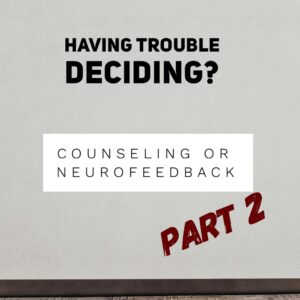Is Teletherapy Right for My Teen? Balancing Convenience and Connection in Oklahoma
By a Licensed Therapist with 20+ Years of Experience Working with Teens in Oklahoma
If you've been searching "online therapy for teens" lately, you're not alone. Across Oklahoma — from Tulsa and Oklahoma City to smaller communities scattered across the plains — parents are asking the same question: Is teletherapy actually good for my teenager, or does something important get lost through a screen?
It's a fair and loving question. You want your teen to get real help, not just a video call that checks a box. As someone who has worked with adolescents for over 20 years, I understand that hesitation deeply. I'll be honest with you: I believe meeting in person — at least once in a while — helps teens see that I'm real, that there's a genuine human being on the other side of this process who cares about them. But I also know that's not always possible. Life in Oklahoma is busy, distances are real, and sometimes a teen will open up more in the comfort of their own bedroom than in a waiting room.
This article walks you through everything you need to know about teletherapy in Oklahoma for teens — what it is, when it works, when in-person may be better, and how to figure out what's right for your family.

Online therapy for teens in Oklahoma — connecting from wherever you are, securely and comfortably.
What Is Teletherapy, and How Does It Work for Teens?
Teletherapy — sometimes called online therapy, virtual counseling, or telehealth therapy — is simply therapy conducted over a secure video platform rather than in an office. Your teen and I see and hear each other in real time, just as we would face to face. Sessions are the same length and follow the same therapeutic structure as in-person appointments. I use a HIPAA-compliant video platform so our session is secure no matter where you are in Oklahoma.
Teens today live part of their life online, so they are often more comfortable than adults doing online therapy. They already FaceTime friends, attend virtual classes, and communicate digitally every day. A video session with a therapist can feel less intimidating than sitting in an unfamiliar office, which sometimes lowers the initial wall and helps teens engage more quickly.
That said, teletherapy is a tool, not a magic solution. Its effectiveness depends on the right fit between the teen, the therapist, the presenting concerns, and the family's involvement. Every teenager is different, and what works beautifully for one may not be the best starting point for another.
The Real Benefits of Online Therapy for Teens in Oklahoma
Accessibility Across the State
Oklahoma is a large state with wide stretches of rural communities where access to specialized adolescent mental health care is genuinely limited. Teletherapy opens doors for families in Enid, Lawton, Stillwater, or any town where the drive to a qualified teen therapist is an hour each way. I've lived most of my life in Edmond, but I did spend part of my young life in a small town in Western Oklahoma, too — so I understand firsthand what it means to be far from resources. When transportation, schedules, or geography create barriers, online therapy for teens can be the difference between getting help and going without it.
Consistency Through Life's Transitions
Teens' lives are rarely predictable. Sports seasons, school schedules, family travel, and extracurricular commitments create constant schedule conflicts. One of the biggest threats to therapeutic progress is inconsistency — gaps in sessions that allow hard-won skills to erode. Teletherapy makes it easier to keep weekly appointments even during busy seasons, which supports the kind of steady momentum that leads to real change.
A Comfortable Environment Can Lower the Guard
Many teens feel more willing to talk about difficult emotions when they're in their own space. The familiar surroundings of their bedroom can reduce the sense of exposure that sometimes makes teenagers clam up in a clinical office setting. That comfort doesn't replace genuine therapeutic connection, but it can help a hesitant teenager take those early steps.
Privacy and Reduced Stigma
For some teens — particularly those who worry about what friends, classmates, or neighbors might think — the privacy of attending therapy from home reduces a real barrier. Adolescent identity development is deeply tied to peer perception, and removing the fear of being "seen" going to therapy can make it easier for teens to commit to the process.
When In-Person Therapy May Be the Better Starting Point
I want to be transparent about something I genuinely believe: there is something meaningful about meeting in person, especially at the beginning of therapy. When a teen can sit across from me in the same room, shake my hand, and look me in the eye, it establishes trust in a way that's harder — though not impossible — to replicate through a screen. They see I'm a real person. That matters.
My office is located on Danforth between Edmond North High School, Sequoyah Middle School, and the University of Central Oklahoma — which means if you're in the area, an in-person session is genuinely convenient. In-person sessions may be especially beneficial for:
- Teens who are highly guarded or skeptical about therapy. The physical presence of a therapist can help break through resistance faster.
- Situations involving complex trauma or significant emotional dysregulation, where non-verbal cues and the therapeutic environment play a larger role.
- Younger teens or those with shorter attention spans, who may find it harder to stay engaged over video.
- Family sessions involving multiple people, which can be logistically more natural in a shared space.
My practice offers both in-person and online sessions, and many families choose a blend of both — starting in person to build the relationship, then shifting to teletherapy for ongoing weekly sessions when life gets busy.

Every teen's path to growth looks different — personalized, evidence-based care makes all the difference.
What Therapeutic Approaches Do I Use with Teens?
Cognitive Behavioral Therapy (CBT) for Adolescents
CBT is one of the most well-researched approaches for teen mental health. It helps teenagers identify the connection between their thoughts, feelings, and behaviors — and learn to challenge thinking patterns that are keeping them stuck. For anxiety, depression, academic stress, and social difficulties, CBT gives teens practical, tangible tools they can use between sessions.
CBT translates well to the teletherapy format because much of the work involves structured exercises, worksheets, and skill-building that can be done through a screen just as effectively as in person. (American Psychological Association, 2020)
Acceptance and Commitment Therapy (ACT)
ACT takes a slightly different approach: rather than fighting difficult thoughts and feelings, it teaches teens to make room for them while staying committed to what matters most. For teenagers who struggle with perfectionism, anxiety about the future, or a sense that they're somehow "broken," ACT can be transformative. It's particularly valuable for teens navigating identity questions, chronic stress, or a feeling of disconnection from their own values.
Christian-Based Therapy (When Desired)
For families whose faith is central to their lives, I also offer a Christian-based therapeutic approach that integrates biblical principles with evidence-based practice. I worked in churches in Oklahoma and Texas for thirteen years, so I'm comfortable integrating faith in discussions — not as a formula, but as a genuine language many Oklahoma families live and breathe. This approach is never imposed — it's always a choice. But for teens and families where faith community is a cornerstone of daily life, having a therapist who can speak that language and honor those values can make therapy feel more aligned and trustworthy. If this matters to your family, please mention it when you reach out.
What Happens During the Intake Process?
Starting therapy shouldn't feel like jumping through hoops. When you first reach out, my goal is simple: get to know your teen and your family, understand what's happening, and begin building a picture of what meaningful progress looks like for you.
The intake process is collaborative from the beginning. I work with parents — not around them. You are your teenager's most important advocate, and I take that seriously. During intake, we will:
- Discuss your teen's specific concerns and goals — not a generic checklist, but what matters to your family.
- Identify how you as a parent can be involved in a supportive, productive way.
- Begin creating a personalized plan tailored to your teen's needs, strengths, and therapeutic preferences.
Parents are partners in this process, not bystanders. That said, I also create appropriate space for your teen to have a voice in their own care — because teenagers who feel ownership over their therapy make far better progress than those who feel like something is being done to them.
What to Expect Once Therapy Is Underway
The Role of Homework in Teen Therapy
Therapy doesn't only happen in the session — it happens in the moments between them. I regularly assign between-session practice, because that's where real integration occurs. This might look like a thought journal, a values-mapping exercise, a communication practice with a parent, or a simple daily check-in routine. These "homework" assignments are always tailored to the teen and never feel like more school.
For teens in online therapy, this is actually an area where the virtual format shines. Digital tools, shared documents, and apps make it easy to track and discuss homework in a way that feels intuitive to this generation.
Family Sessions as Needed
Teen struggles rarely exist in a vacuum. When it's clinically appropriate, I incorporate family sessions into the treatment process. These aren't about blame or putting anyone on the spot — they're about improving communication, rebuilding trust, or helping parents understand what their teen is experiencing so they can offer better support at home. Family involvement, done thoughtfully, consistently improves outcomes for adolescents. (SAMHSA, Behavioral Health Services for Adolescents)
Is Teletherapy in Oklahoma Private Pay?
My practice operates on a private pay basis, which means I do not bill insurance directly. This approach allows me to offer more flexible, personalized care without the constraints that insurance billing can sometimes place on treatment frequency, duration, and approach.
I encourage you to reach out directly to discuss what that looks like for your family's situation. Many families find that private pay therapy — especially when offered in a telehealth format that saves commuting time and costs — makes a great deal of sense for their needs.
Why 20 Years of Experience with Teens Makes a Difference
I've worked with teenagers across a wide range of settings, challenges, and life circumstances for over two decades. What that time has taught me more than anything is this: teens are not small adults, and they are not helpless children. They are some of the most courageous, perceptive, and resilient people I've ever had the privilege of sitting with.
They also respond with remarkable sensitivity to whether or not they feel seen by the adults around them — including their therapist. Whether we meet in person or over video, my entire approach is built around making your teenager feel genuinely understood, respected, and capable of growth. That relational foundation is what makes everything else possible.
Is Teletherapy Right for My Teen? — Decision Guide
Quick Takeaways
- Teletherapy is effective for teens, but the best format — online, in-person, or a combination — depends on the individual teenager and their needs.
- Oklahoma families benefit significantly from online therapy options due to the state's geographic spread and busy family schedules.
- In-person therapy builds trust quickly, especially for hesitant or guarded teens, and is available at my Edmond office on Danforth.
- Evidence-based approaches like CBT and ACT work well in both virtual and in-person settings and give teens real, usable skills.
- Faith-based therapy is available for families who want their values woven into the therapeutic process — informed by 13 years of church ministry experience.
- Parents are active partners in the intake and ongoing care process — family sessions are incorporated as needed.
- Private pay practice allows for more personalized, flexible care tailored to each family.
Conclusion
Deciding whether teletherapy is right for your teenager is not a one-size-fits-all question — and that's exactly how it should be. Your teen is unique. Their struggles, their strengths, their comfort level, and your family's rhythms all matter when making this decision.
What I can tell you, after 20 years of working with adolescents in Oklahoma and beyond, is that the most important factor is not the format — it's the relationship. A teenager who trusts their therapist, feels genuinely understood, and has a personalized plan built around their goals will make progress whether they're sitting across from me in my Edmond office or talking to me from their bedroom.
If your teen is struggling and you've been wondering whether to take the next step, I want to encourage you: reach out. You don't have to have it all figured out first. We'll figure it out together. My practice offers both in-person and online sessions throughout Oklahoma, and the intake process is designed to be collaborative, clear, and human from the very first conversation.
Your teenager deserves support that's built around them. That's exactly what I'm here to provide.
Frequently Asked Questions
Let's Keep the Conversation Going
Did any part of this article resonate with your experience as a parent of a teenager in Oklahoma? I'd love to hear what questions are still on your mind. Share this post with another parent who might be wrestling with the same question, and feel free to reach out directly if you're ready to explore whether teletherapy — or in-person sessions — might be the right next step for your family.
What's the biggest factor holding your teen back from trying therapy? Share below — your answer might help another parent navigating the same thing.
References
- American Psychological Association. (2020). Telehealth guidance by state during COVID-19. apa.org
- National Alliance on Mental Illness (NAMI). Mental Health by the Numbers. nami.org
- Centers for Disease Control and Prevention. (2023). Youth Risk Behavior Survey Data Summary & Trends Report. cdc.gov
- American Academy of Pediatrics. (2022). Policy statement on telehealth and adolescent mental health access. aap.org
- Substance Abuse and Mental Health Services Administration (SAMHSA). Behavioral Health Services for Adolescents. samhsa.gov
Ready to Book Your Appointment?
Read More from Jerred

Is Teletherapy Right for My Teen? Balancing Convenience and Connection
As a therapist who has worked with Oklahoma teens for over 20 years, I know that the most important factor in therapy isn’t whether we meet online or in person — it’s the relationship we build together. This guide helps parents understand when teletherapy works best, when in-person sessions matter more, and how to find the right fit for their teenager.

Beyond Talk Therapy: Understanding Counseling vs. Neurofeedback (Part 2)
Discover how objective QEEG brain mapping removes the guesswork from mental health treatment by providing a personalized roadmap for your teenager’s brain. Learn why neurofeedback’s relaxing, medication-free approach is a powerful alternative for teens who are “talked out” or struggling with ADHD and anxiety.

Beyond Talk Therapy: Understanding Counseling vs. Neurofeedback (Part 1)
Traditional counseling uses “top-down” verbal processing to build coping skills and insight, while neurofeedback employs “bottom-up” brain training to regulate neurological patterns directly. Together, these approaches offer a comprehensive pathway to mental wellness by addressing both the psychological and physiological roots of challenges like ADHD, anxiety, and depression.

Stress vs. Depression in Young Men: A Parent’s Guide
As a therapist who has worked with young men for over twenty years, I’ve witnessed countless parents struggle to understand what their sons are experiencing—is it stress or depression? Understanding the difference is crucial because young men express depression differently than women, often through anger and irritability rather than sadness, making it easy to miss the warning signs.

How Long Does Neurofeedback Take to Work?
Google My Business Post Summaries
Two-Sentence Summary
Wondering how long neurofeedback takes to work? Most people need 20-40 sessions to experience substantial, lasting improvements, with about 70% noticing subtle changes within their first 1-3 sessions that gradually become more consistent and meaningful over time.

Why It’s OK to Not be Okay: Performance Anxiety Help
Starting your professional career should feel exciting, but for many young adults, it comes with an unexpected companion: performance anxiety that goes beyond typical nervousness. If you’ve felt your heart race before presentations, questioned whether you deserve your position, or avoided speaking up in meetings, you’re not alone—and evidence-based therapy approaches like CBT and ACT can help you thrive professionally while managing anxiety effectively.
